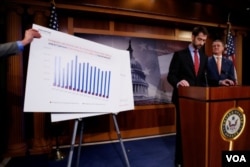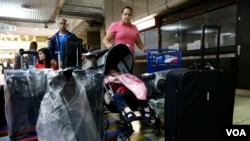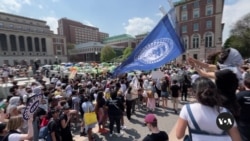Student Union
Will Green Cards Be Cut in Half?
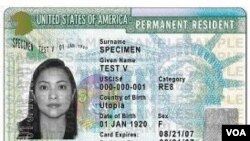
Sure, the likelihood of getting the Diversity Immigrant Visa is slim — about 0.3 percent. But 14 million applicants try to win one of about 50,000 spots in the Green Card lottery each year.
As of early February, though, the diversity visa is once again facing an uncertain future. Republican Senators Tom Cotton of Arkansas and David Perdue of Georgia proposed a bill ending it, in addition to dramatically cutting the number of other legal immigrants and refugees allowed every year.
A similar bill in the House of Representatives narrows the scope, only proposing to end the diversity visa.
The 22-year-old visa lottery has been threatened before in legislation sponsored by Republicans and Democrats as recently as last year. But it never became law.
Now with a Republican-controlled Congress and a president who has focused on immigration, the program is again at risk with the Reforming American Immigration for Strong Employment (RAISE) Act.
In a statement announcing the bill, the senators claimed it will “help raise American workers' wages.”
"We are taking action to fix some of the shortcomings in our legal immigration system," Perdue said. "Returning to our historically normal levels of legal immigration will help improve the quality of American jobs and wages."
Research has shown that the connection between jobs for Americans and immigration is tenuous. But there are other arguments against the lottery program.
For one, the program is susceptible to fraud, both by and against applicants, as the U.S. General Accountability Office found a decade ago.
The State Department improved the application to reduce the number of people who submit multiple applications in the same year, which is an automatic disqualification. Also, it alerts applicants that the lottery is free, and businesses charging a fee to submit lottery applications on applicants' behalf is illegal.
At its core, the diversity lottery was designed — as the name suggests — to diversify the immigrant stream to the U.S. from countries with lower immigration rates. When a country sends more than 50,000 immigrants to the U.S. in five years, they are excluded from the eligibility list.
Natives of Bangladesh, Brazil, Canada, China, Colombia, Dominican Republic, El Salvador, Haiti, India, Jamaica, Mexico, Nigeria, Pakistan, the Philippines, Peru, South Korea, the United Kingdom (excepting Northern Ireland), and Vietnam were excluded from the most recent round of applications.
For applicants who don’t have a family or employer sponsor in the U.S., or who aren’t refugees, the Green Card lottery is the only option.
The lottery is a small portion of immigration to the U.S. every year, but larger than employment-based immigrant visas. In Fiscal Year 2015, the U.S. issued about 48,000 diversity visas out of 531,000 immigrant visas.
Carolien Hardenbol, a diversity visa recipient from the Netherlands, moved to the U.S. in the late 1990s with her husband as new parents with advanced degrees and a sense of adventure. Uncertain they would be sponsored for permanent residency through work, they applied for the diversity lottery — and her husband won.
"I envisioned this big hat where these envelopes were drawn,” she joked.
What started as a volunteer position with Sanctuary for Families, a nonprofit organization in New York that provides legal services to victims of domestic violence and human trafficking, turned into a career for Hardenbol. After getting her legal permanent residency, she became co-director of the Immigration Intervention Project there.
"Without diversity there would be no United States of America," says Hardenbol.
Do fewer immigrants mean more jobs for Americans?
The bill’s announcement follows a series of executive orders by President Donald Trump targeting immigrants, which have been met with lawsuits and protests.
It also reflects the policy suggestions of some groups who want to restrict immigration. Reducing or ending the diversity visa has been a platform for groups who want reduce immigration to the U.S.
The RAISE Act calls for cuts in family preference visas, refugee admissions, and the diversity lottery, while only adding a new W visa, to allow the foreign-born parents of adult U.S. citizens to visit for renewable five-year periods, without a path to citizenship or work approval.
Some immigration supporters say the 50,000 visas could be better used.
Florida-based immigration attorney John Gihon supports ending the diversity lottery, but only in favor of making more family visas available and creating a different opportunity for highly trained immigrants.
“People with degrees in STEM subjects, medicine, nursing, etc, that we know will provide them with an opportunity to find work and contribute to the country should not be denied the green cards simply because there is currently no employer to sponsor them and give them a job,” says Gihon.
Tekleab Elos Hailu applied a few times before winning the lottery. The father of three is a native of Eritrea; his wife is Ethiopian. They applied for the lottery while he was on a graduate scholarship in the United Kingdom, following a conflict between their home countries in the late 1990s.
His first job in the U.S. was working security at a rental car company, though he eventually returned to academia, researching the experiences of fellow diversity lottery recipients and finishing his doctorate. He now works at a community college in Colorado.
Because of the education or work experience required by the lottery, and the needs to be able to apply - like access to the internet and the funds to pay for the eventual green card fees, health screening, and travel - he believes diversity immigrants generally come from relatively well-off positions in their home countries, and as such are a net positive for the U.S.
“They sacrifice what they have had in their own countries, just to bring to change for their children,” says Hailu. “On the other hand, the United States gains from people who have been educated, without spending any money on these people. So why would you [cut it]?”
The RAISE Act has been referred to the Senate Judiciary Committee for review.
Follow legislative actions on S. 354 here here and H.R.1178 - SAFE for America Act here.
This story was first reported in VOANews.com. Do you have or want a Green Card? Please leave a comment here, and visit us on Facebook, Twitter, Instagram and LinkedIn, thanks!
See all News Updates of the Day
Canada limits international student visas
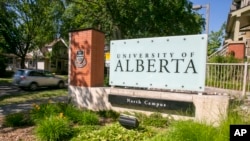
Saying the country has seen a massive spike in temporary immigrants – such as foreign workers – Canadian Prime Minister Justin Trudeau announced caps on international student visas.
Canada hosted more than 1 million international students in 2023, according to the Washington Post. That’s the same number as the United States, a country eight times its size. (April 2023)
Protests dwindle to tiny numbers, subtle defiant acts at US college graduations

A tiny contingent of Duke University graduates opposed pro-Israel comedian Jerry Seinfeld speaking at their commencement in North Carolina Sunday, with about 30 of the 7,000 students leaving their seats and chanting "free Palestine" amid a mix of boos and cheers.
Some waved the red, green, black and white Palestinian flag. Seinfeld, whose decade-long namesake show became one of the most popular in U.S. television history and who continues to draw legions of fans to his Netflix specials and TV appearances such as "Comedians in Cars Getting Coffee," was there to receive an honorary doctorate from the university.
"After spending four years at what is considered one of the finest institutions of higher education in the world, they apparently feel that perhaps some light entertainment will get you all to the final realization, 'You know, I think I've really had enough of this place,'" Seinfeld said.
The stand-up turned actor and recent star, director and co-writer of the movie "Unfrosted," has publicly supported Israel since it invaded Gaza to dismantle Hamas after the organization attacked the country and killed some 1,200 people in southern Israel on Oct. 7. The ensuing war has killed nearly 35,000 people in Gaza, mostly women and children, according to Gaza's Health Ministry, which doesn't distinguish between civilians and combatants.
Students at campuses across the U.S. responded this spring by setting up encampments and calling for their schools to cut ties with Israel and businesses that support it. Students and others on campuses whom law enforcement authorities have identified as outside agitators have taken part in the protests from Columbia University in New York City to UCLA.
At the University of California, Berkeley, on Saturday, a small group of pro-Palestinian demonstrators waved flags and chanted during commencement and were escorted to the back of the stadium, according to the San Francisco Chronicle. There were no major counterprotests, but some attendees voiced frustration.
"I feel like they're ruining it for those of us who paid for tickets and came to show our pride for our graduates," said Annie Ramos, whose daughter is a student. "There's a time and a place, and this is not it."
The small student protest Sunday at Duke's graduation in Durham, North Carolina, was emblematic of campus events across the U.S. Sunday after weeks of student protests roiled U.S. campuses in recent weeks and resulted in nearly 2,900 arrests at 57 colleges and universities.
This weekend's commencement events remained largely peaceful.
At Emerson College in Boston, some students took off their graduation robes and left them on stage. Others emblazoned "free Palestine" on their mortar boards. One woman, staring at a camera broadcasting a livestream to the public, unzipped her robe to show a kaffiyeh, the black and white checkered scarf commonly worn by Palestinians, and flashed a watermelon painted on her hand. Both are symbols of solidarity with those living in the occupied territories.
Others displayed messages for a camera situated on stage, but the livestream quickly shifted to a different view, preventing them from being seen for long. Chants during some of the speeches were difficult to decipher.
Protests at Columbia University, where student uprisings inspired others at campuses across the country, led the school to cancel its main graduation ceremony in favor of smaller gatherings.
The University of Southern California told its valedictorian, who publicly backed Palestinians, that she could not deliver her keynote speech at its graduation ceremony because of security concerns. It later canceled its main graduation ceremony.
At Depaul University in Chicago, graduation is more than a month away. But as the academic year closes, school leaders said they had reached an "impasse" with the school's pro-Palestinian protesters, leaving the future of their encampment on the Chicago campus unclear.
The student-led DePaul Divestment Coalition, which is calling on the university to divest from economic interests tied to Israel, set up the encampment nearly two weeks ago. The group alleged university officials walked away from talks and tried to force students into signing an agreement, according to a student statement late Saturday.
- By VOA News
Students weigh in on how colleges can prepare undergrads for work

Inside Higher Ed surveyed undergraduates on the best way to prepare for the workforce.
One group of students in Oregon built a for-profit snowboarding business as part of their degree. Colleen Flaherty reports. (April 2024)
- By VOA News
Many African students are experiencing US visa rejections

In 2022, 71% of student visa applications from Western Africa were rejected.
Visa agents are not happy – and are finding ways to help applicants with paperwork and the interview. Maina Wururu reports for The PIE News. (April 2024)
- By Tina Trinh
US college students face muted graduations amid Gaza war protests
Commencement ceremonies are being scaled back or canceled at U.S. universities because of security concerns over pro-Palestinian student protests. While some campus demonstrations have resulted in concessions, others have led to violent confrontations. VOA’s Tina Trinh has the story from New York.




